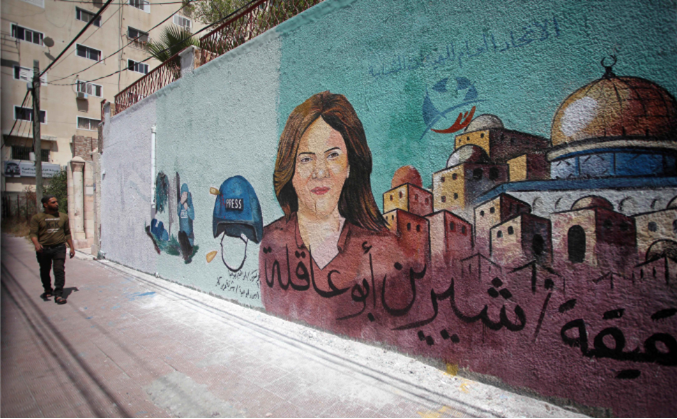On May 11, Palestinian-American journalist Shireen Abu Akleh, an Al Jazeera reporter who covered Palestine for two decades, was shot and killed while covering an Israeli military raid in the Jenin refugee camp in the occupied West Bank. Even as evidence mounted that Israeli forces had opened fire on her and nearby journalists, U.S. media’s coverage in many cases committed to a back-and-forth framing involving Israeli and Palestinian forces, obscuring who was responsible.
In the weeks that followed Abu Akleh’s death, research groups, human rights groups, and news organizations undertook investigations to determine who killed her, with outlets including CNN and the Associated Press finding evidence that Israeli forces were responsible.
AP reported: “Multiple videos and photos taken on the morning of May 11 show an Israeli convoy parked just up a narrow road from Abu Akleh, with a clear line of sight. They show the reporters and other bystanders in real time taking cover from bullets fired from the direction of the convoy.”
“The only confirmed presence of Palestinian militants was on the other side of the convoy, some 300 meters (yards) away, mostly separated from Abu Akleh by buildings and walls,” AP wrote. This contradicts Israeli officials, who circulated a video that they claimed showed a Palestinian militant shooting in the area. Eyewitnesses said there were no militants in the area and no gunfire until the salvo that killed Abu Akleh and injured another reporter.
Two weeks after the killing, FAIR evaluated coverage by U.S. corporate media, which the outlet said eschewed “The context of escalating Israeli attacks on freedom of the press and on journalists in the Occupied Territories.”
The New York Times initially wrote Abu Akleh was “shot as clashes between the Israeli military and Palestinian gunmen took place in the city,” with the opening paragraphs of that piece establisingh a dichotomy between Al Jazeera and Israeli officials. The Times quoted Al Jazeera saying the outlet “holds the Israeli government and the occupation forces responsible for the killing of Shireen,” then quoted the Israeli military chief of staff and minister of defense, who “emphasized the uncertainty” of whether it was Israeli or Palestinian forces who killed her.
In another article, the Times moved from a profile of the journalist into a “both-sides” framing: “She was shot in the head in the West Bank city of Jenin, Al Jazeera and the Palestinian Health Ministry said, blaming Israeli forces for her death. The Israeli military said on Twitter that ‘Palestinian armed gunfire’ might have been responsible.”
ABC News coverage of the killing employed a similar structure, saying, “The head of the Palestinian Authority blamed Israel for her death and rejected Israeli calls for a joint investigation.”
More recently, The New York Times editorial board published a piece entitled “Who Killed Journalist Shireen Abu Akleh?” apparently leaning further into a “balanced” framing of the killing. The editorial board purported that “The world still knows very little about who is responsible for her death.”
Amid the forensic investigation, the Times said “the two sides are at loggerheads,” as Palestine holds the bullet that killed Abu Akleh and Israel holds the rifle. After describing the Palestinian Authority’s two-week investigation into the killing, the Times added a dismissal: “Israel rejected any suggestion that the killing was deliberate, calling the allegation a ‘blatant lie.’”
The Times article mentioned investigations by news organizations such as CNN, which reported that the evidence suggested “Abu Akleh was shot dead in a targeted attack by Israeli forces.” The editorial board then said “Israel reacted sharply,” with President Isaac Herzog rejecting the report and claiming it was based on “fake facts.” The article said Herzog’s rejection makes it more important “to get a full accurate accounting” with an independent investigation conducted with American, Israeli and Palestinian participation.
FAIR wrote of coverage prior to the Times editorial board’s piece, “The reporting illustrated how ‘balance’ and fragments of disjointed ‘facts’ have become a stylistic method to confuse and obliterate meaningful connections that drain compassion, outrage and demands for justice for the victims of state violence.”
Image by Mahmoud Ajjour / The Palestine Chronicle

